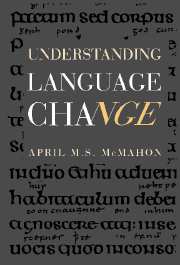Book contents
- Frontmatter
- Contents
- Preface and acknowledgements
- 1 Introduction
- 2 Three views of sound change
- 3 Sound change 2: the implementation problem
- 4 Morphological change
- 5 Syntactic change 1: the Transparency Principle
- 6 Word order change and grammaticalisation: language change and general laws
- 7 Semantic and lexical change
- 8 Language contact
- 9 Linguistic variation
- 10 Pidgins and Creoles
- 11 Language death
- 12 Linguistic evolution?
- Bibliography
- Index
10 - Pidgins and Creoles
Published online by Cambridge University Press: 05 June 2012
- Frontmatter
- Contents
- Preface and acknowledgements
- 1 Introduction
- 2 Three views of sound change
- 3 Sound change 2: the implementation problem
- 4 Morphological change
- 5 Syntactic change 1: the Transparency Principle
- 6 Word order change and grammaticalisation: language change and general laws
- 7 Semantic and lexical change
- 8 Language contact
- 9 Linguistic variation
- 10 Pidgins and Creoles
- 11 Language death
- 12 Linguistic evolution?
- Bibliography
- Index
Summary
Introduction
The pidgin English as spoken in these days is about the most atrocious form of speech perhaps one could find in any corner of the globe. It is neither one thing nor the other. Consisting of a mixture of Samoan and Chinese here and there, with an occasional word of Malayan, it is conglomeration truly worthy of the Tower of Babel
(Rabaul Times, 16 October 1925; quoted Romaine 1988: 10).This quotation, taken from a newspaper published in Papua New Guinea, specifically involves Tok Pisin, the pidgin language of New Guinea which is now becoming a Creole and which has been recognised as one of the official languages of the country. However, the criticisms contained in it are characteristic of earlier attitudes to pidgin and Creole languages, both inside and outside linguistics. Popularly, pidgins and Creoles are often still written off as ‘inferior, haphazard, broken, bastardized versions of older, longer established languages’ (Todd 1990: 1); and although the first systematic studies of pidgins and Creoles were carried out in the 1880s by Hugo Schuchardt, these languages were subsequently shunned by linguists, who saw them as aberrant and uninteresting, for the best part of a century. The first conference on pidgin and Creole studies took place only in 1959, and most of the key ideas in the field date from this time or later. The study of language birth is therefore a new, expanding, and often controversial one.
- Type
- Chapter
- Information
- Understanding Language Change , pp. 253 - 283Publisher: Cambridge University PressPrint publication year: 1994



